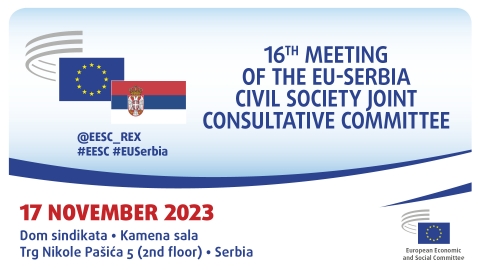The EU-Serbia Joint Consultative Committee – JCC held a meeting on November 17 in Belgrade. The JCC discussed the current state of play in EU-Serbia relations and accession process negotiations with the EU, challenges for the civil society in Serbia and an overview of the rule of law situation in Serbia.
The declaration :
- calls on Serbia to seize the new enlargement momentum and define its genuine objectives and direction by clarifying its foreign policy stances and resolving its outstanding regional issues;
- warns about the need not only for reforms, but for their genuine implementation;
- congratulates the EESC for opening its doors to candidate countries through Enlargement Candidate Members (ECMs) initiative;
- supports the new Growth Plan for the Western Balkans and the findings of the Serbia Report 2023, while stressing that the Fundamentals cluster remains crucial and non-negotiable;
- expresses deeps concerns about the rise of violence in Serbia and notes the amplitude of the citizens’ past and current protests as a call to open and promote channels of genuine dialogue;
- recommends the attribution of the 5th national frequency in a manner to obtain media pluralism so necessary to the Serbian media landscape;
- gives recommendations for fairer and free elections on 17/12;
- gives recommendations to ensure an enabling environment for the vibrant Serbian civil society to thrive, as the backbone of any real democracy.
You can read whole Declaration here.
The EU-Serbia Civil Society Joint Consultative Committee (JCC) is one of the bodies set up under the Stabilisation and Association Agreement between the European Union and Serbia. The JCC enables civil society organisations (CSOs) from both sides to monitor Serbia’s progress towards the European Union, and to adopt recommendations for the attention of the government of Serbia and the EU institutions. The JCC understands the notion of civil society as encompassing organisations of employers, trade unions and other economic, social and civic interests.
Source: EESC








